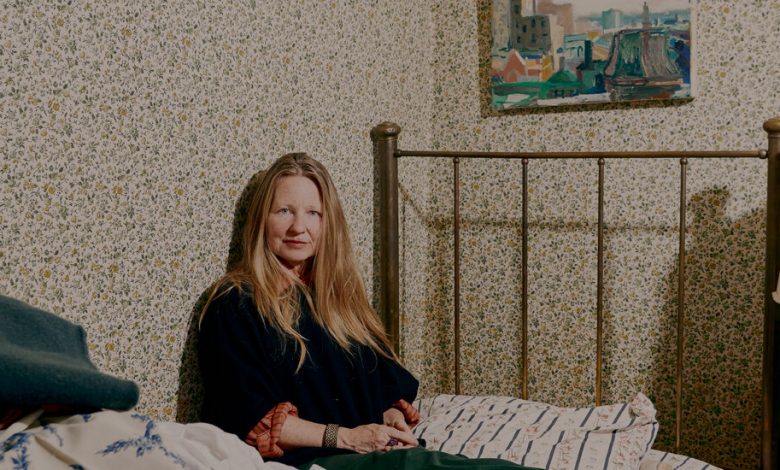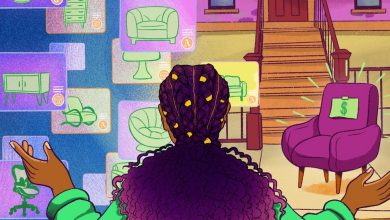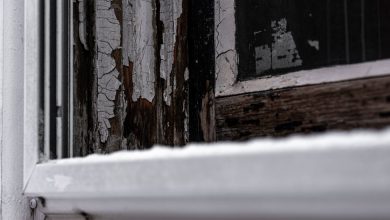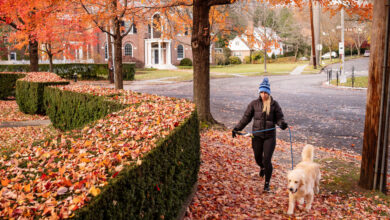Novelist Samantha Hunt Revisits Her ‘Haunted’ Childhood Home

A few months before her novel “Mr. Splitfoot” was published in 2016, Samantha Hunt had to solicit marketing blurbs from other authors.
“It’s embarrassing to ask my friends and writers I admire to work for me, for free,” said Ms. Hunt, a writer of haunting literary fiction. “Blurbs are work. So I thought, Well, if blurbs are labor, why not just pay for one? It would be easier, fairer. And then I thought, since I was already going to a bunch of mediums as research for ‘Mr. Splitfoot,’ why not just ask one to call up Charlotte Brontë and get a blurb from her?”
So she went to see a medium in Albany. In a dark, windowless office, Ms. Hunt said, the medium tried to make contact. Supposedly speaking as the author of “Jane Eyre,” she offered the opinion that “Mr. Splitfoot” was a good title.
“‘It’s what people want,’” Ms. Hunt recalled the medium saying, in the Brontë voice. “‘It has a lot of good energy and people, people will like it. It’s intriguing.’”
Ms. Hunt doubted that Brontë, the great 19th-century author, would talk like that, but those words appeared as a back-cover blurb, attributed to “Charlotte Brontë, speaking through a medium.”
Despite her skepticism, Ms. Hunt, 50, said she remains intrigued by mediums and the work they do. “How much is intuition? How much is listening? How much is being an observer? I believe in all of those things,” she said last week during a visit to her childhood home in Pound Ridge, N.Y. “As a writer, it’s my job to listen. It’s my job to observe everything and to pick up on who people are.”
In her latest work, “The Unwritten Book: An Investigation,” an essay collection published on Tuesday, Ms. Hunt considers how the Pound Ridge house, originally built in 1765 and expanded since, has informed her writing and worldview. It’s a haunted house, she said, though not in the traditional sense.
“I started to think about the way we get haunted as a process of calcification,” she said. “‘Haunted’ is when something accompanies you, when we are not fully aware of a presence. It’s something that you carry around inside of you.”
Her mother, Diane Hunt, 85, has lived in the house since the family moved in more than 50 years ago. The author’s father, Walter Hunt, who worked as an editor at Reader’s Digest, died in 2001 at 71.
The house is now “filled with things from people who we love who are dead,” Ms. Hunt said. She compared it to art installations by Nick Cave or Portia Munson, calling it “a wacky museum where you can touch everything.”
Its rooms are brimming with collections: patchwork quilts, her father’s neckties hanging behind a door, costumes in the attic, thousands of art books, and dozens of canvases her mother has painted over the decades.
A portrait in the dining room shows Ms. Hunt as a girl surrounded by ripe fruit, a candle, a goblet and a memento mori.
“I put a skull in it,” Diane Hunt said, “which was not nice.”
Ms. Hunt laughed and said of her mother: “She appears to be a delicate flower, but she’s a morbid one, too!”
In the living room, she gestured toward a large painting of a shadowy male figure situated behind a blindfolded woman.
“And that one is you,” she said to her mother, “even though you said it’s not?”
“I guess it had to be me, because I don’t think I had a model,” her mother said.
“I always think of that as you and Dad,” Ms. Hunt said. “Even though it’s kind of creepy.”
“Some people think it’s creepy,” her mother said. “Some people think it’s romantic.”
‘An Antenna for the Uncanny’
The house was lively and noisy when Ms. Hunt was growing up, often filled with neighborhood kids, who seemed to like the anything-goes atmosphere. She and her five siblings also had to contend with adults who drank their way through marathon parties. In “The Unwritten Book,” she recalls “disheveled clothes, jealous brawls, dirty songs at 2 a.m.,” as well as “uncles stumbling down staircases” and “visiting editors sleeping on the living-room floor.” Some nights ended with adults driving into a ditch at the end of the driveway.
To escape the chaos, Ms. Hunt found herself gravitating toward her father’s Royal typewriter. “Writing seemed like a quiet place in this house that was not quiet at all,” she said.
At 15, she left home to attend Northfield Mount Hermon, a “hippie” boarding school in Massachusetts. “My first religion teacher came in and said, ‘Hi, I’m a feminist!’ And I was like, ‘What’s that?’” she recalled.
She later studied geology, printmaking and literature at the University of Vermont. After graduation, she lived in a geodesic dome and supported herself by waiting tables and working in a garment factory. Almost every morning she got up before dawn and wrote fiction, a practice she continued when she held jobs at Seven Days, an alternative weekly in Burlington, Vt., and The Village Voice in New York.
Ms. Hunt, who lives upstate with her husband, the journalist Joe Hagan, and their three children, has published three novels and a short story collection. Her first novel, “The Seas,” earned the National Book Foundation’s 5 Under 35 award. Her second, “The Invention of Everything Else,” based on the life of Nikola Tesla, was shortlisted for the Orange Prize. In 2017 she published her story collection, “The Dark Dark,” and received a Guggenheim Fellowship in fiction.
“Her sensibility is like an antenna for the uncanny,” said the writer and editor Ed Park, who worked with Ms. Hunt at The Village Voice.
Ms. Hunt said she recently unearthed a story she had written in her early 20s, about two girls on a road trip. The girl at the wheel speaks the entire time, while the other one is silent. (Fans of her novels will recognize this twist.) “Of course, it turns out that the girl in the back seat is dead,” she said. “I couldn’t believe I’ve been writing the same story for 25 years.”
Some readers have been paying attention almost as long. “Sam has been steadily writing innovative, eccentric and transporting books for the past 20 years now,” said the poet and essayist Maggie Nelson, who wrote an introduction to a reissue of “The Seas.” “Her work is always feminist in a very profound way, which is to say, it speaks to difference while allowing for fascinating cross-identifications and new metaphysical possibilities.”
‘Walter Victorious’
Before the family moved into the Pound Ridge house, Diane Hunt implored any specters to remain hidden. “I said, ‘If there are spirits here, that’s fine. You’re welcome to stay. But don’t let me see you,’” she said. “And they never have.”
Thanks to the original stone chimney and American chestnut floors, made in the 1700s from a species of tree that’s now virtually extinct, the past is always present. “I was always aware of how many families had lived here before mine,” Samantha Hunt said.
The most lively household spirit belongs to her father, who condensed books as part of his work at Reader’s Digest. The family believes he visits in the form of cardinals, Ms. Hunt said. Her mother added that, once, when she had lost her wedding ring, she asked her late husband where it was. Almost immediately she found it “in a pile of debris in a little purse in the hall,” she said.
Walter Hunt favored Gilbey’s gin and Schlitz beer, and his drinking meant that Ms. Hunt and her siblings were always on their guard. “The children of alcoholics are detectives, alert to the slightest changes in scent, demeanor, and language,” she writes in “The Unwritten Book.”
She also notes in the book that his ashes are still in the house, inside a cookie tin labeled “Walter Victorious.”
“It might be lost again,” Ms. Hunt said during my visit. She turned to her mother. “We had it about a year ago, remember?”
She left the kitchen and went upstairs.
“Check behind the bishop’s bench!” her mother shouted, referring to a foldout table in the hallway.
Ms. Hunt returned a few minutes later, a little out of breath.
“He was in the attic,” she said.
She was carrying her father’s briefcase, the same one he took to the Reader’s Digest office in his Oldsmobile Starfire. In the living room, she opened it to reveal the tin that held his ashes, as well as a stack of condolence letters and an old lottery ticket.
“He was a big lottery fan,” Ms. Hunt said. “He played every day.”
“Oh, yes, every day,” her mother said.
The title of “The Unwritten Book” comes from his unfinished novel, which Ms. Hunt discovered in his desk shortly after his death. She includes excerpts from it between her essays, with annotations to reveal the connections between his fiction and the family.
“My father liked puzzle books and tricks and games,” she said, “so he would be happy to think that something strange happened with his work.”
Source link






